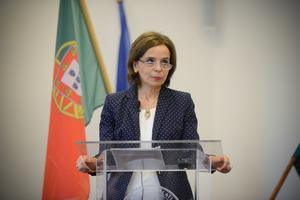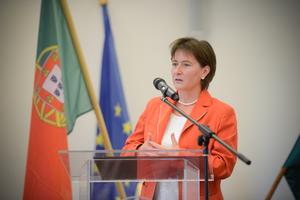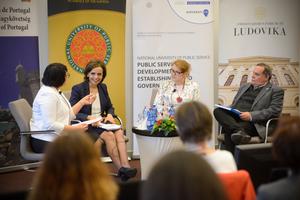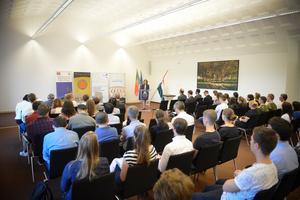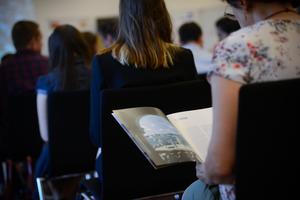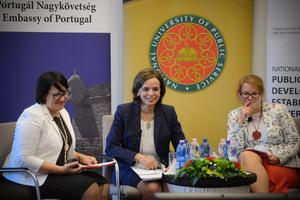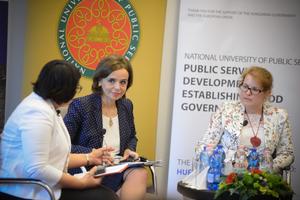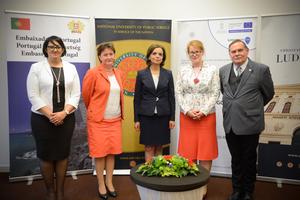H.E. Maria José Morais Pires, Ambassador Extraordinary and Plenipotentiary of the Republic of Portugal to Hungary was the next guest of the Ambassador Forum at Ludovika on 2 May. The title of her presentation was „Portugal today”.
H.E. Maria José Morais Pires fulfills her role as Ambassador to Hungary since 2015. She joined the Portugese diplomatic service in 1984. She was the Permanent Representative of Portugal to the Council of Europe in Strasbourg between 1989-1994. After that she served many roles in diplomacy, including, but not limited to the Deputy Director General for European Union Affairs, Minister Plenipotentiary (1st and 2nd class), and Deputy President of the National Commission of UNESCO.
The event, organised by the International Relations Office, was opened by Dr. habil. Györgyi Nyikos. The NUPS’ Vice-Rector for International Affairs highlighted the importance of the event saying that the Ambassador Forum at Ludovika is a platform for discussing challenges in the world. She thanked Her Excellency Maria José Morais Pires for accepting the invitation of the university, and mentioned that it is a great opportunity for students to meet ambassadors in person and ask questions regarding today’s diplomacy.
At the beginning of her speech, Her Excellency mentioned that it is not the first time she’s visiting the Ludovika Building: she has been here for several times in the past. The topic of her speech was “Portugal today”. She mentioned the similarities between Hungary and Portugal: both countries have an area of a little more than 90 thousand square kilometers and a population of around ten million people. The two countries are both partners in the European Union, as well as allies in the framework of NATO. She highlighted the positive changes after the “Carnation Revolution” in 1974, these changes were aimed at fulfilling the so-called “Three Ds”: Democratization, Decolonization and Development. Regarding Democratization, public debate is lively and free and covers all the political spectrum - though there is no extremist right-wing formation in Parliament- and the media convey very adequately the plurality of positions, namely of the 5 major political parties. The elections for the President of the Republic, for Parliament and for Local Government have been taking place regularly and peacefully.
Referring to Development, Her Excellency pointed out that Portugal had been a founding member of the “European Free Trade Association” (EFTA) in 1960. This proved to be a useful preparation for European multilateral trade policies and tariff reductions but the great step forward, both in political and economic terms, could only be achieved if the country joined the European Economic Community – EEC.
Thanks to EU policies there has been development in the health care services and education in Portugal, the GDP has increased, and children mortality rates dropped. Unfortunately, the great financial and economic crisis struck Portugal as well from 2008, when some of the main private banks collapsed due to excessive debts and this created the need for the government to help support the savings of many of their clients. Since then, Portugal has experienced a remarkable recovery from the crisis, and continued the growth of its GDP – it was up by 2,6% in 2017.
One of the reasons of this recovery is tourism: last year, 20.6 million tourists visited Portugal, which is a very high number. The sector of energy production is another example of the development in the country: the investment in renewable energy sources (hydroelectric and wind power) has led to an excellent result, when in 2016, for 4 whole days, all the electricity being consumed in the country came from renewable sources.
Regarding the foreign policy of Portugal, Her Excellency highlighted that they prioritize their participation in the European Union in all its facets with a full support to the on-going EU building process towards a more integrated, cohesive, enlarged, stable and peaceful Europe. They also promote and recognize the Portuguese communities abroad, as well as the language and culture. Her Excellency pointed to the fact that around 400 students currently follow Portuguese language courses in Budapest, where the Camões Institute is responsible for the coordination of the courses. They also recognize the predominance of the United Nations in the multilateral sphere, with a particular attention given to its role in the promotion and protection of Human Rights as well as in the Human Development programmes. Finally, Her Excellency expressed her gratitude for the invitation to the Forum, and she donated two books for the library of NUPS about Portugal.
The presentation of Her Excellency was followed by a roundtable discussion. The discussion was moderated by Dr. Zsuzsanna Peres, Vice-Dean for Science and International Affairs. The experts of the session were Mr. István Rákóczi, linguist, literary historian, historian, associate professor of ELTE, and Ms. Fanni Takács-Mandák, lecturer at the Faculty of Science of Public Governance and Administration of NUPS. Her Excellency mentioned that there is a good relationship between the Portuguese speaking countries, despite the fact that they have their own problems what they try to solve. Answering one of the questions from the audience regarding the factors shaping the Portuguese foreign policy, she said that, besides geography, their NATO connections are very important, as they are one of the founding members, and also the communities of Portuguese people living abroad shaped the foreign policy of Portugal.
